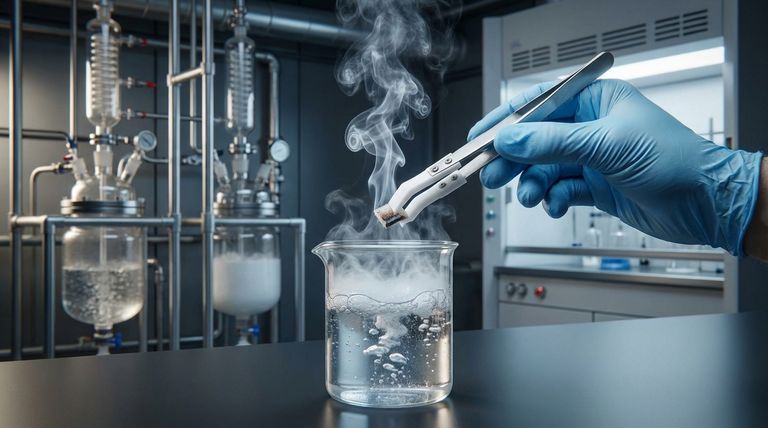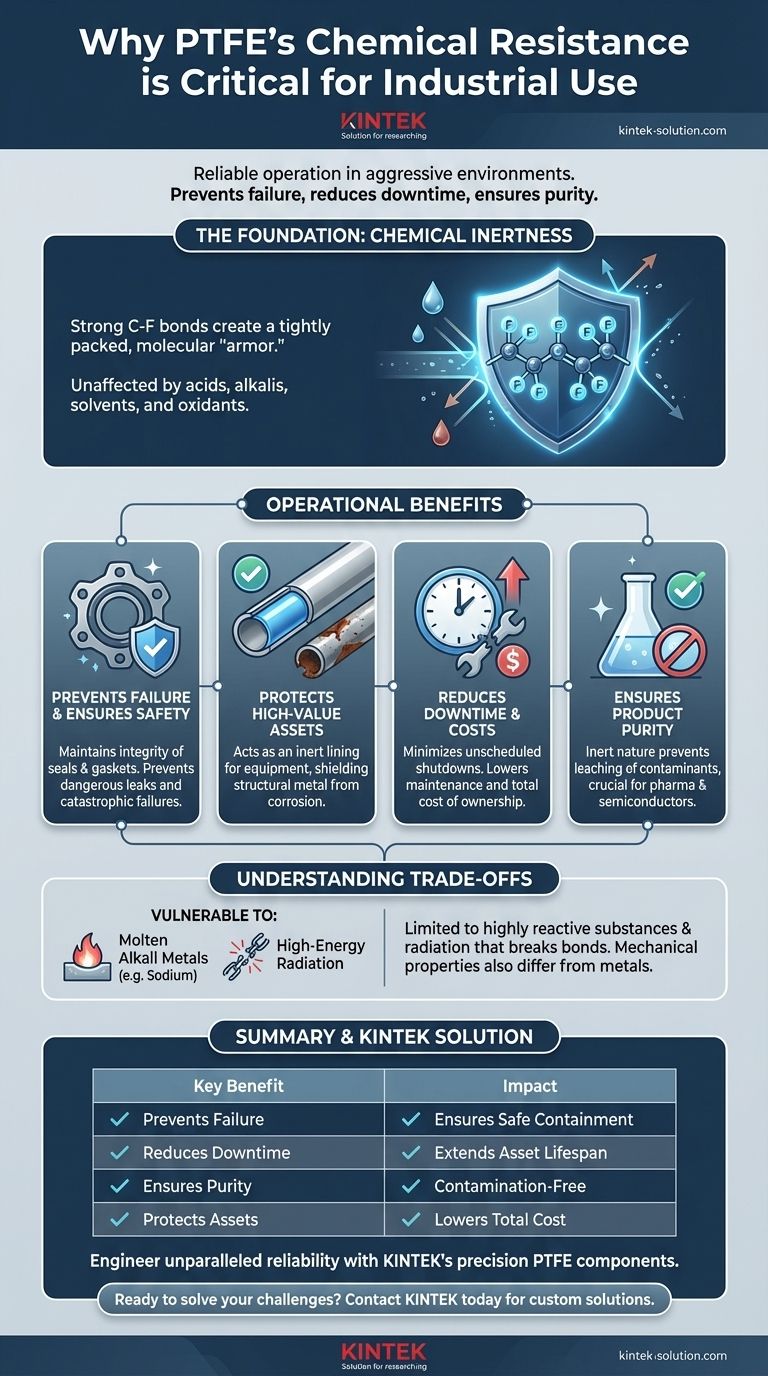In short, PTFE's chemical resistance is critical because it allows industrial equipment to operate reliably and safely in environments that would rapidly destroy most other materials. Its ability to withstand aggressive acids, bases, and solvents prevents catastrophic failures, reduces costly downtime, and ensures the purity of the end product.
The core value of Polytetrafluoroethylene (PTFE) is not just its resistance to chemicals, but its near-total chemical inertness. This property translates directly into operational resilience, making it a foundational material for any process involving corrosive or reactive substances.

The Foundation of PTFE's Value: Chemical Inertness
PTFE, commonly known by the brand name Teflon, is a synthetic polymer with a unique set of properties. While it has several valuable traits, its exceptional chemical resistance is arguably the most important for industrial applications.
What "Chemically Resistant" Truly Means
For PTFE, this term signifies an almost universal resilience. It remains completely unaffected by the vast majority of industrial chemicals, including concentrated acids, alkalis, aggressive solvents, fuels, and powerful oxidants.
This stability means PTFE components do not swell, dissolve, or degrade when in constant contact with these harsh substances. It essentially behaves as if the chemical isn't there.
The Source of Its Strength
The remarkable stability of PTFE comes from its molecular structure. The strong, stable bonds between carbon and fluorine atoms create a tightly packed, protective "sheath" around the polymer backbone.
This molecular armor is extremely difficult for other chemicals to attack or break down, resulting in the material's signature inertness.
Translating Resistance into Operational Benefits
This chemical inertness is not just a technical specification; it is a direct driver of safety, efficiency, and cost savings in demanding industries like chemical processing, pharmaceuticals, and semiconductor manufacturing.
Preventing Equipment Failure and Ensuring Safety
In any system handling corrosive fluids, the weakest points are often the seals, gaskets, and O-rings. Failure of these small components can lead to dangerous leaks.
Because PTFE maintains its physical integrity and sealing capability in these environments, it is the default choice for containing aggressive media and ensuring a safe operational environment.
Protecting High-Value Assets
PTFE is frequently used as a lining for pipes, valves, and reaction vessels. By creating an inert barrier, it protects the structural metal of the equipment from corrosion.
This dramatically extends the lifespan of expensive assets, preventing the need for frequent and costly replacements.
Reducing Downtime and Maintenance Costs
When materials degrade, processes must be shut down for repair and replacement, leading to lost production and high maintenance expenses.
The durability of PTFE in harsh chemical settings minimizes these unscheduled shutdowns. This leads to greater operational uptime, predictable maintenance cycles, and a lower total cost of ownership.
Understanding the Trade-offs and Limitations
While its chemical resistance is exceptional, PTFE is not a universally perfect material. An objective evaluation requires acknowledging its specific limitations.
It Is Not Completely Invincible
PTFE can be attacked by a very small number of highly reactive substances. These are typically limited to molten alkali metals (like sodium) and the most aggressive fluorinating agents, such as fluorine gas and chlorine trifluoride.
For the overwhelming majority of industrial applications, these exceptions are not a concern.
Vulnerability to High-Energy Radiation
PTFE's primary weakness is its relatively poor resistance to high-energy radiation. This type of radiation can break the polymer's strong carbon-fluorine bonds, causing the material to become brittle and lose its structural integrity.
Mechanical Properties are a Separate Consideration
While chemically robust, PTFE is a relatively soft material with lower tensile strength compared to metals. Factors like mechanical wear, pressure, and temperature must be considered alongside its chemical compatibility.
Making the Right Choice for Your Goal
Selecting PTFE is a strategic decision based on the primary demands of your application.
- If your primary focus is maximum safety and containment: PTFE is the default choice for seals, gaskets, and linings when handling aggressive and hazardous chemicals.
- If your primary focus is uptime and cost reduction: Using PTFE components in corrosive environments is a direct investment in reducing maintenance cycles and extending equipment life.
- If your primary focus is product purity: The inertness of PTFE is critical in pharmaceutical and semiconductor applications, as it will not leach contaminants into the process media.
Ultimately, choosing PTFE is a strategic decision to engineer reliability directly into the core of your most demanding processes.
Summary Table:
| Key Benefit | Impact on Industrial Operations |
|---|---|
| Prevents Equipment Failure | Ensures safe containment of aggressive acids, bases, and solvents, preventing dangerous leaks. |
| Reduces Downtime & Maintenance | Minimizes unscheduled shutdowns and extends the lifespan of costly assets like pipes and valves. |
| Ensures Product Purity | Prevents contamination in sensitive industries like pharmaceuticals and semiconductors due to its inert nature. |
| Protects High-Value Assets | Acts as a durable lining to shield structural metal from corrosion, lowering total cost of ownership. |
Engineer unparalleled reliability into your most demanding processes with KINTEK's precision PTFE components.
At KINTEK, we specialize in manufacturing high-performance PTFE seals, liners, labware, and custom fabrications for the semiconductor, medical, laboratory, and industrial sectors. Our expertise ensures your equipment operates safely and efficiently, even when exposed to the most aggressive chemicals.
By choosing KINTEK, you gain:
- Enhanced Safety: Leak-proof containment of hazardous substances.
- Reduced Operational Costs: Minimized downtime and extended equipment life.
- Guaranteed Purity: Contamination-free processing for critical applications.
- Custom Solutions: Prototypes to high-volume orders tailored to your exact needs.
Ready to solve your chemical resistance challenges? Contact KINTEK today to discuss your specific requirements and receive a custom solution quote.
Visual Guide

Related Products
- Custom PTFE Parts Manufacturer for Teflon Parts and PTFE Tweezers
- Custom PTFE Parts Manufacturer for Teflon Containers and Components
- Custom PTFE Sleeves and Hollow Rods for Advanced Applications
- Custom PTFE Sealing Tapes for Industrial and High Tech Applications
- Customizable PTFE Rods for Advanced Industrial Applications
People Also Ask
- How does the composition of PTFE differ from other plastics? Unlocking Its Unique Chemical & Friction Properties
- What are the key properties of PTFE (Polytetrafluoroethylene)? Unlock Superior Performance in Harsh Environments
- What are the key applications enabled by PTFE's properties? Solve Extreme Mechanical, Chemical & Electrical Challenges
- What makes Teflon a valuable ingredient in personal care product formulations? Enhance Performance with Unique Properties
- What are the characteristics of PFA material? A Guide to Its High-Performance Balance
- How did Teflon transition from industrial to consumer use? From Aerospace to Your Kitchen
- What are the benefits of using Teflon in manufacturing projects? Solve Critical Surface Interaction Problems
- What are the different grades of PTFE and their uses? A Guide to Selecting the Right Material



















